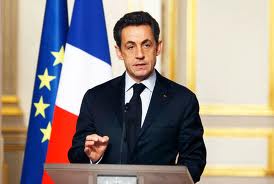
Paris, April 30: The French presidential race entered the home straight on Sunday with both incumbent right-winger Nicolas Sarkozy and Socialist frontrunner Francois Hollande battling to shake off the taint of scandal.
Sarkozy accused Hollande supporters in the media of mounting a "despicable" smear against him by publishing a document purporting to show Muammar Gaddafi's former Libyan regime agreed to fund his previous presidential campaign in 2007.
Meanwhile, the Socialists were embarrassed when several senior figures in Hollande's campaign attended an ally's birthday party and found that disgraced former IMF head Dominique Strauss-Kahn had also been invited.
Both events revived interest in these long-running scandals just one week before France goes back to the polls and just days before Hollande and Sarkozy were to face off in a televised debate which could prove decisive. The latest opinion poll published by the LH2 institute for web portal Yahoo! forecast that Hollande would comfortably win the May 6 run-off by 54% of the vote to Sarkozy's 46%, a smaller gap than in LH2's last estimate. But polling has yet to take into account the effects, if any, of the latest controversies, neither of which appear fatal to either campaign, but which may reinforce the voters' disdain for the political class.
On Saturday, investigative news website Mediapart published a copy of an internal Libyan regime document recording an alleged 2006 illegal funding deal between Tripoli and Sarkozy's 2007 campaign. According to the note, which Mediapart claims to have obtained from former Libyan regime figures, Tripoli agreed to pay Sarkozy's 2007 campaign $66 million.
"It's despicable. It's a forgery . Mediapart is well used to dishonesty. It's an agency in the service of the left," Sarkozy said.
And the man to whom the memo was supposedly addressed - Bashir Saleh, Gaddafi's former chief of staff and head of Libya's 40-billion-dollar sovereign wealth fund - denied ever receiving such a communication. Meanwhile, Socialist figure Julien Dray invited Hollande's campaign director Pierre Moscovici, communications director Manuel Valls and former partner Segolene Royal to a drinks party to celebrate his birthday.
But he apparently failed to tell them he had also invited Strauss-Kahn , who is now a political pariah and under judicial investigation for his alleged ties to a prostitution network. Royal said she had left as soon as she heard Strauss-Kahn was coming, without seeing him.





Comments
Add new comment